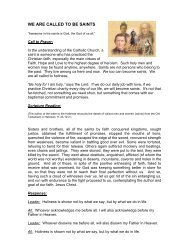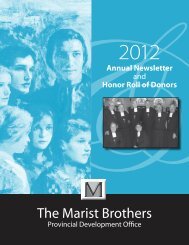A Heart That Knew No Bounds: Text and Reflection Questions
A Heart That Knew No Bounds: Text and Reflection Questions
A Heart That Knew No Bounds: Text and Reflection Questions
Create successful ePaper yourself
Turn your PDF publications into a flip-book with our unique Google optimized e-Paper software.
man. Marcellin was, by this time in his life, aware of God’s continual <strong>and</strong> powerful<br />
presence; Mary had also come through for him often enough that he counted on<br />
her protection without question. The Memorare in the Snow was simply an<br />
external manifestation of the much deeper spiritual reality of the man. When the<br />
Revolution of 1830 broke out, <strong>and</strong> soldiers invaded the Brothers’ home, the<br />
Hermitage, Champagnat turned again to Mary who came to his aid. From that<br />
point on, the community decided to start each day with the Salve Regina (Hail<br />
Holy Queen), a practice retained by the Brothers to this day.<br />
<strong>Reflection</strong> <strong>Questions</strong><br />
5. The needs of others <strong>and</strong> their suffering often shape <strong>and</strong> transform us. How did<br />
both affect Marcellin’s character, outlook on life, <strong>and</strong> his spirituality? How did they<br />
work together to make him the person that he became?<br />
6. How have the needs <strong>and</strong> sufferings of others shaped <strong>and</strong> transformed you<br />
made you the person that you are today? How have they moved you to take<br />
action for the gospel’s sake?<br />
There was nothing petty about Marcellin Champagnat. He had a passion<br />
for the gospel. It is not surprising, therefore, that obedience <strong>and</strong> love were the<br />
two virtues he recommended to his early followers. They are, after all, the<br />
foundation of community. Obedience is its mainstay; love binds all other virtues<br />
together <strong>and</strong> makes them perfect. Of this second, there was to be no limit.<br />
Marcellin loved his brothers; he expected no less from them, each one for the<br />
other.<br />
Throughout his life, the founder was fond of saying, “to bring up children<br />
properly, we must love them, <strong>and</strong> love them all equally”. The virtue of love,<br />
therefore, was to be not only the foundation of community but also of a distinctive<br />
Marist method of evangelization <strong>and</strong> education. It had been Mary’s way with<br />
Jesus; it was now to be the way of all who followed the dream that so captured<br />
the heart of this country priest <strong>and</strong> his early brothers.<br />
Shortly after Christmas in1825, Marcellin’s health began to fail <strong>and</strong>, as<br />
usual he turned to Mary <strong>and</strong> he regained sufficient health to continue directing<br />
the Brothers.<br />
When he completed his last will <strong>and</strong> testament, it included a summary of<br />
the spirituality of his “Little Brothers”. Practice the presence of God, he told them<br />
it is the soul of prayer, meditation, <strong>and</strong> all the virtues. Let humility <strong>and</strong> simplicity<br />
be the characteristics that distinguish you from others, <strong>and</strong> maintain always a<br />
spirit of poverty <strong>and</strong> detachment. Have a filial <strong>and</strong> tender devotion to Mary, he




